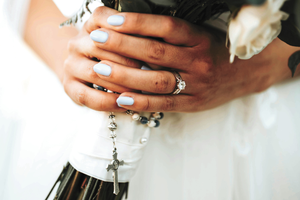Addressing the Dating ‘Pendulum’ Problem on College Campuses
You can date ‘intentionally’ without dating too ‘intensely.’

Are you a college student hoping to date?
If so, welcome to a dating culture dictated by two extremes: engage in hook-up culture or act like you’re married after the first date.
Both are recipes for hurt and frustration, albeit in different ways.
The short-term, surface-level hook-up relationships are rooted in the rocky foundation of lust and sexual intimacy — a far cry from the vision of dating that the Church promotes.
But perhaps in response to the ills of the hook-up culture, some Catholics swing the pendulum to the other side, where dating couples act like they’re already married. Though these couples are not (usually) having sex, they converse and act like they’ve already joined their lives together.
Weeks into dating, they begin planning a long-term future together. They do everything together, reluctant to leave each other’s side at the expense of other friendships.
And early on, they bear their entire heart and soul to one another, disregarding the concept of emotional chastity, which calls us to avoid using another for emotional gratification.
Wanting to avoid meaningless encounters, this approach ends up mistaking “intensity” for “intentionality,” meaning dating purposefully.
Sounds weird? Well, this is the norm at Catholic colleges.
Heightening Heartbreak
So what’s the issue with intense relationships early on?
Couples opt to live in a fictional reality, neglecting their current vocation — as college students.
Sure, at one point, conversations about next steps are necessary.
But if they happen prematurely, they often lead to unnecessary emotional entanglements that can cause heartache if things end.
Couples make “promises” of wedding bells and baby carriages early in a relationship, only to break up months later.
The aftermath is as dirty as those newborn diapers they hoped for, leaving individuals simmering over broken promises and unrealized dreams.
If the couple had recognized that they are called to discern, not plan, a future, those wounds and anger would be minimal.
The Pressure Cooker
These intense relationships adversely affect the broader community by placing students in a relationship “pressure cooker.”
Couples feel ashamed if they break up because they did not “make it,” leading many to keep dating long after things should end.
As a result, many young Catholics are reluctant to go on a first date, falsely believing they are making a commitment to marry that person.
Recently, I asked a sophomore why he was reluctant to ask out a young woman when both have expressed interest in the other.
His response?
“I am afraid that it will not work out.”
Of course it may not work out.
But that’s the whole point of dating: to find out if it will.
One coffee date does not end at the altar.
Intentional, Not Intense
Somewhere in the middle, a sweet spot exists.
But what does it look like?
That is the million-dollar question.
Searching for an answer, I called Mario Sacasa, a Catholic relationship counselor who hosts the podcast Always Hope.
He shared that “we can be intentional with relationships, but do not have to be intense.”
Skeptical, I peppered him with questions derived from my own relationship and the ones I see at Benedictine College.
He shared five precepts for a healthy relationship.
You are not married, so don’t spend all of your time together.
“Don’t lose yourself in the context of dating,” Sacasa told me.
“Find that balance between spending time with your significant other while making time for other friendships and to grow as an individual.”
Have physical and emotional boundaries.
“Do not cross any sort of physical or intense emotional boundaries in the early stages of a relationship.
Allow it to be an opportunity just to get to know one another.
Intimacy will form over time,” Sacasa said.
Always discern and surrender to God’s will.
“Always ask if your relationship is progressing. That’s all you need to ask,” Sacasa said.
“You don’t need to say, ‘Oh, we have been dating for six months, and I’m unsure if I will marry her, so we better break up.’ That is the type of pressure that causes so much disruption.”
Live the relationship. Relationships need to be human, meaning we must spend time together, Sacasa explained.
“You have to go on dates; spend quality time together; we have to do activities that help us explore each other’s personalities.”
Talk, talk, and talk some more. Open lines of communication are critical, Sacasa shared.
The key to any healthy relationship is that you feel comfortable talking about relationship issues with your significant other.
“Let some of that fear about the future or the relationship go and give space to have open and honest conversations that will help you to grow and date in a healthy way.”
You heard the counselor — dating well is possible.
Set those physical and emotional boundaries; remember, you are not married.
Have fun, have good conversations, and enjoy each other’s company.
Dating is a special time when you intentionally learn about another person.
So ask the person you like out, or say “Yes” to that date.

















